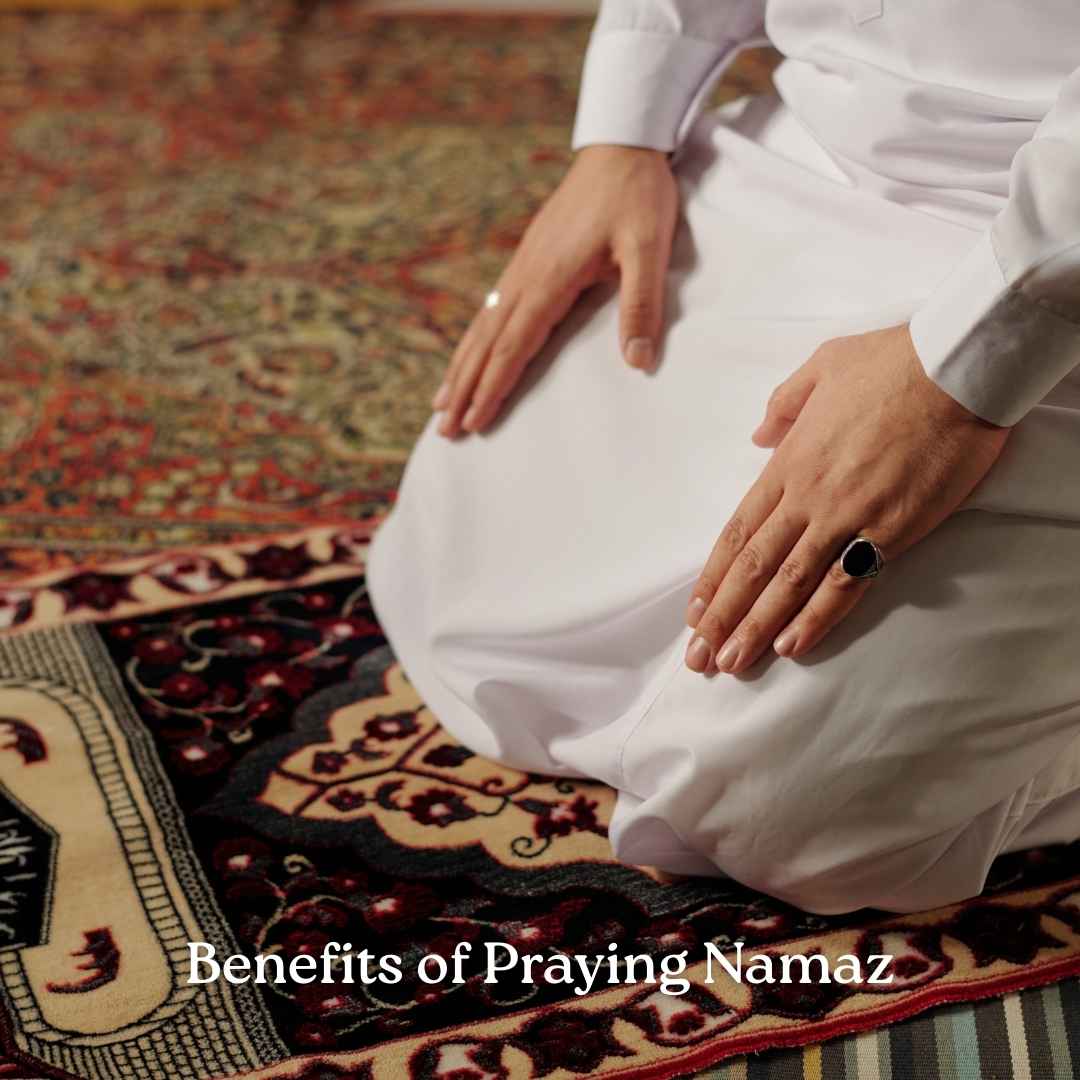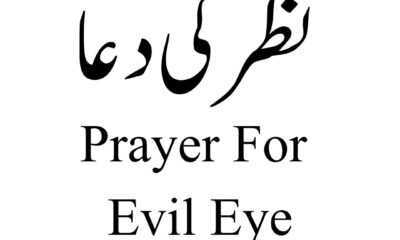Prayers
Bad Nazar Ki Dua

Bad Nazar Ki Dua: A Shield Against the Evil Eye
Understanding the Evil Eye
The concept of the “evil eye” or “bad nazar” is prevalent in many cultures, particularly in South Asia and the Middle East. It’s believed that a malicious gaze can cause misfortune, illness, or even accidents. To ward off this negative energy, people often turn to prayers and amulets.
The Power of Dua
In Islamic tradition, Dua (supplication) is a powerful tool to seek protection from harm and misfortune. It’s believed that sincere prayers can shield individuals from the ill effects of the evil eye.
Dua Against the Evil Eye
Here’s a common Dua recited to protect oneself and loved ones from the evil eye:
A’uzu billahi min sharri ma khalaqa
This Dua, when translated, means:
“I seek refuge in Allah from the evil of what He has created.”
How to Recite the Dua
- Cleanliness: Perform Wudu (ablution) before reciting the Dua.
- Sincerity: Recite the Dua with a sincere heart and belief in its power.
- Regular Practice: Make it a habit to recite the Dua regularly, especially when you feel vulnerable or exposed to negative energy.
Additional Tips for Protection
- Amulet: Wear a Taweez (amulet) inscribed with Quranic verses or the name of Allah.
- Black Dot: Apply a black dot (kajal) to the forehead of infants to ward off the evil eye.
- Positive Affirmations: Regularly recite positive affirmations to boost your spiritual energy.
Remember: While Dua is a powerful tool, it’s important to maintain a positive mindset and surround yourself with good company. By combining faith, positive thinking, and protective measures, you can effectively shield yourself from the ill effects of the evil eye.
Prayers
Importance of Daily Prayers in Islam

In Islam, daily prayers (Salah or Namaz) are the most fundamental form of worship and the cornerstone of a Muslim’s spiritual life. Performing prayers consistently is not just a ritual; it is a means to strengthen faith, seek forgiveness, and cultivate mindfulness.
Allah says:
“Indeed, prayer prohibits immorality and wrongdoing, and the remembrance of Allah is greater. And Allah knows that which you do.”
(Surah Al-Ankabut 29:45)
Daily prayers offer Muslims a structured way to connect with Allah, maintain discipline, and achieve inner peace. In this article, we will explore the importance of daily prayers, including spiritual, psychological, physical, social, and moral benefits, supported by Quranic verses and authentic Hadith.
1. Daily Prayers as a Pillar of Islam
Daily prayers are one of the five pillars of Islam, highlighting their significance in a Muslim’s life.
Prophet Muhammad ﷺ said:
“The first thing for which a person will be brought to account on the Day of Judgment is his prayer. If it is sound, then the rest of his deeds will be sound.”
(Sahih Muslim 233)
The five daily prayers — Fajr, Dhuhr, Asr, Maghrib, and Isha — serve as constant reminders of faith, helping Muslims maintain a strong spiritual connection with Allah throughout the day.
2. Spiritual Benefits of Daily Prayers
a) Strengthens Faith (Iman)
Regular prayers reinforce a Muslim’s belief in Allah, reminding them of His presence and guidance in daily life.
Allah says:
“Establish prayer at the two ends of the day and at the approach of the night. Indeed, good deeds erase bad deeds.”
(Surah Hud 11:114)
Through consistent prayer, a believer develops taqwa (God-consciousness) and a deep understanding of their responsibility to Allah.
b) Forgiveness of Sins
- Daily prayers provide continuous spiritual purification.
- Prophet ﷺ said:
“Whoever performs the five daily prayers with sincerity, his minor sins will be forgiven.”
(Sahih Muslim 233)
c) Intimacy with Allah
- Daily prayers allow for direct communication through Dua and Dhikr.
- Each Rak’ah (unit of prayer) is an opportunity to seek guidance, protection, and mercy.
Prophet ﷺ said:
“The closest a servant comes to his Lord is when he is prostrating; so increase supplications in it.”
(Sahih Muslim 482)
3. Psychological and Emotional Benefits
a) Reduces Stress and Anxiety
- Praying at set times offers a structured pause from daily worries.
- Concentration on Allah during prayer releases tension and promotes mental clarity.
b) Enhances Emotional Stability
- Repeating Quranic verses and Dhikr fosters positive emotions and reduces feelings of helplessness.
- Daily prayers encourage gratitude, patience, and hope.
c) Encourages Mindfulness
- Salah requires focus and concentration, teaching Muslims to live in the moment.
- Mindfulness during prayer improves decision-making and emotional regulation.
4. Physical Benefits of Daily Prayers
Daily prayers involve movements that enhance physical health:
a) Flexibility and Stretching
- Bowing (Ruku) and prostration (Sujood) stretch muscles, ligaments, and joints.
- This improves overall flexibility and mobility.
b) Muscle Strength and Posture
- Standing (Qiyam) and sitting (Jalsa) strengthen legs, core, and back.
- Sujood supports spinal health and posture.
c) Circulation and Stress Relief
- Repeated movements enhance blood flow, benefiting heart health.
- Mindful breathing during Salah reduces stress hormones like cortisol.
Scientific studies have shown that Salah can function as a light form of exercise and meditation, promoting holistic wellness.
5. Social and Moral Benefits
a) Builds Discipline
- Fixed prayer times instill routine and self-discipline.
- Muslims structure their day around prayers, enhancing time management.
b) Encourages Equality
- Congregational prayers (Jama’ah) unite people regardless of social or economic status.
- Standing shoulder-to-shoulder emphasizes equality before Allah.
c) Moral Development
- Awareness of Allah promotes ethical behavior.
- Daily prayers encourage honesty, humility, and charity.
Allah says:
“Establish prayer and give zakah, and whatever good you put forward for yourselves – you will find it with Allah.”
(Surah Al-Baqarah 2:110)
6. Benefits of Daily Prayers by Each Salah
a) Fajr (Dawn Prayer)
- Sets a spiritual tone for the day.
- Provides protection and guidance for daily activities.
- Prophet ﷺ said:
“Whoever prays Fajr is under the protection of Allah.”
b) Dhuhr (Noon Prayer)
- Acts as a break from work or daily tasks.
- Refocuses energy physically and spiritually.
c) Asr (Afternoon Prayer)
- Reduces fatigue and keeps one spiritually aware.
d) Maghrib (Sunset Prayer)
- Promotes reflection and gratitude at the day’s end.
- Encourages evening forgiveness and protection.
e) Isha (Night Prayer)
- Calms the mind before sleep.
- Provides an opportunity for nightly reflection and Dua.
7. Benefits of Congregational Prayers
- Reward multiplied:
Prophet ﷺ said:
“Prayer in congregation is twenty-seven times more rewarding than prayer performed individually.”
(Sahih Bukhari 645)
- Builds community bonds and encourages accountability.
- Reinforces discipline and unity among Muslims.
8. Daily Prayers and Character Development
- Strengthens self-control and moral integrity.
- Reduces arrogance, selfishness, and envy.
- Promotes compassion, charity, and social responsibility.
Prophet ﷺ said:
“A Muslim is the one from whose tongue and hand the people are safe.”
(Sahih Bukhari 10)
9. Spiritual Elevation Through Daily Prayers
- Provides forgiveness of sins and purification of the soul.
- Helps cultivate Taqwa (God-consciousness).
- Brings inner peace, contentment, and hope.
Allah says:
“Recite what has been revealed to you of the Book and establish prayer. Indeed, prayer prohibits immorality and wrongdoing.”
(Surah Al-Ankabut 29:45)
10. Daily Prayers as a Form of Physical Exercise
- Qiyam (standing) strengthens legs and back.
- Ruku (bowing) stretches spine and hamstrings.
- Sujood (prostration) improves flexibility and blood circulation.
- Jalsa (sitting) strengthens knees and core.
Five daily prayers provide consistent, light physical activity throughout the day.
11. Psychological and Mental Health Benefits
- Regular Salah reduces anxiety and depression.
- Encourages mindfulness and emotional stability.
- Provides structure and purpose, reducing feelings of emptiness or stress.
Prophet ﷺ said:
“Verily, in the remembrance of Allah do hearts find rest.”
(Surah Ar-Ra’d 13:28)
12. Benefits for Children and Youth
- Instills discipline and routine early in life.
- Encourages spiritual awareness and ethical behavior.
- Builds emotional resilience and gratitude.
Prophet ﷺ said:
“Teach your children Salah when they are seven years old, and discipline them for it at ten.”
(Abu Dawood 495)
13. Duas and Remembrance During Daily Prayers
- Tasbih and Dhikr enhance spiritual rewards.
- Recommended Tasbih:
- Subhanallah (Glory be to Allah)
- Alhamdulillah (All praise is due to Allah)
- Allahu Akbar (Allah is the Greatest)
Prophet ﷺ said:
“Whoever glorifies Allah after every prayer will have his sins forgiven, even if they are as much as the foam of the sea.”
(Sahih Muslim 597)
14. Common Mistakes to Avoid
- Rushing through prayers.
- Lack of focus or understanding.
- Skipping Sunnah and Nafl prayers.
- Neglecting the spiritual and reflective aspect of Salah.
Solution: Learn proper steps, recitation, and meanings.
15. Practical Tips to Maximize Benefits
- Perform all five daily prayers on time.
- Include Sunnah and Nafl prayers.
- Focus on intent and humility.
- Learn meanings of recited verses.
- Make Dua after each prayer.
16. Conclusion: Embrace Daily Prayers
Daily prayers are the foundation of a Muslim’s spiritual, moral, and physical well-being.
- Spiritual: Strengthens faith, forgiveness, and connection to Allah
- Psychological: Reduces stress, enhances mindfulness and emotional stability
- Physical: Improves flexibility, circulation, and overall fitness
- Social and Moral: Builds discipline, equality, and ethical character
Daily prayers are more than rituals; they are a path to holistic well-being, inner peace, and spiritual growth.
For authentic guidance on prayers, Duas, and Islamic teachings, visit 👉 surahyaseen.net.
Prayers
Benefits of Praying Namaz

Namaz (Salah) is the cornerstone of Islamic worship and a fundamental pillar of faith. It is more than a ritual; it is a daily conversation with Allah, providing spiritual, mental, and physical benefits to those who practice it consistently.
Allah says:
“Establish prayer at the two ends of the day and at the approach of the night. Indeed, good deeds erase bad deeds.”
(Surah Hud 11:114)
Praying Namaz regularly helps Muslims maintain a strong connection with Allah, develop discipline, and achieve peace of mind. In this article, we will explore the spiritual, psychological, social, and physical benefits of Namaz, supported by Quranic verses and authentic Hadith.
1. Spiritual Benefits of Praying Namaz
a) Strengthens Faith and Iman
Namaz reinforces the believer’s faith (Iman) and reminds them of Allah’s constant presence.
Allah says:
“Indeed, prayer prohibits immorality and wrongdoing, and the remembrance of Allah is greater.”
(Surah Al-Ankabut 29:45)
Through consistent prayer, a Muslim maintains consciousness of Allah (Taqwa), strengthens their spiritual immunity against sin, and deepens their reliance on divine guidance.
b) Forgiveness of Sins
Performing Namaz with sincerity leads to forgiveness of past sins.
Prophet Muhammad ﷺ said:
“The five daily prayers and from one Friday prayer to the next serve as expiation for sins committed in between, as long as major sins are avoided.”
(Sahih Muslim 233)
This highlights that Namaz is a continuous purification process for the soul.
c) Connection with Allah
Namaz allows Muslims to communicate directly with Allah, making Dua and supplication more effective.
- Each Rak’ah is an opportunity to seek guidance, forgiveness, and mercy.
- The act of bowing, prostrating, and standing reflects humility and submission.
Prophet ﷺ said:
“The closest a servant comes to his Lord is when he is prostrating; so increase supplications in it.”
(Sahih Muslim 482)
2. Psychological and Emotional Benefits
a) Reduces Stress and Anxiety
- Namaz provides a structured pause from worldly concerns.
- Focusing on Allah during Salah helps release negative thoughts and promotes inner peace.
b) Improves Emotional Stability
- Regular prayer helps Muslims develop patience, gratitude, and emotional resilience.
- Reciting Quranic verses and Dhikr during Namaz reinforces positive thinking and hope.
c) Enhances Mindfulness
- Performing each step of Namaz attentively encourages presence in the moment.
- The mind learns to concentrate, making daily tasks more focused and productive.
3. Social and Moral Benefits
a) Encourages Discipline and Routine
- Observing five daily prayers at fixed times instills self-discipline.
- Muslims organize their day around Fajr, Dhuhr, Asr, Maghrib, and Isha, promoting time management.
b) Promotes Equality and Brotherhood
- Congregational prayers (Salah in Jama’ah) unite people of all social, economic, and ethnic backgrounds.
- Standing shoulder-to-shoulder in the mosque emphasizes equality before Allah.
c) Encourages Moral Behavior
- Regular prayer prevents immoral conduct.
- Awareness of Allah in daily life encourages honesty, humility, and ethical behavior.
Allah says:
“Establish prayer and give zakah, and whatever good you put forward for yourselves – you will find it with Allah.”
(Surah Al-Baqarah 2:110)
4. Physical Benefits of Praying Namaz
Namaz is not only spiritual but also physically beneficial due to its structured movements:
a) Improves Flexibility and Circulation
- Bowing (Ruku) and prostration (Sujood) stretch muscles, ligaments, and joints, improving flexibility.
- The repeated movement enhances blood circulation and heart health.
b) Strengthens Muscles and Joints
- Standing (Qiyam) and sitting (Jalsa) strengthen leg muscles and core stability.
- Sujood helps maintain spinal health and posture.
c) Reduces Stress Hormones
- Controlled breathing and focus during Salah reduce cortisol levels, promoting relaxation.
- The meditative aspect of prayer enhances mental clarity.
Studies have shown that regular prayer has similar benefits to light physical exercise and meditation.
5. Types of Benefits in Detail
a) Immediate Benefits
- Sense of peace and clarity after each Salah
- Relief from stress and anxiety
- Reconnection with spirituality
b) Long-term Benefits
- Continuous forgiveness of sins
- Strengthened moral character
- Improved emotional resilience
- Health benefits from regular physical movements
6. Benefits of Congregational Namaz (Salah in Jama’ah)
Praying in congregation multiplies spiritual reward and social benefits:
- Prophet ﷺ said:
“Prayer in congregation is twenty-seven times more rewarding than prayer performed individually.”
(Sahih Bukhari 645)
a) Builds Community Bonds
- Encourages interaction, empathy, and support within the Muslim community.
- Promotes a sense of belonging and responsibility.
b) Encourages Accountability
- Regular mosque attendance fosters discipline and commitment to faith.
7. Benefits of Namaz in Different Times
a) Fajr (Dawn Prayer)
- Sets a spiritual tone for the day
- Offers protection and guidance for the day ahead
- Sunnah of Prophet ﷺ emphasizes:
“Whoever prays Fajr is under the protection of Allah.”
b) Dhuhr (Noon Prayer)
- Break from worldly distractions
- Recharges energy physically and spiritually
c) Asr (Afternoon Prayer)
- Reduces afternoon fatigue
- Brings focus back to spiritual mindfulness
d) Maghrib (Sunset Prayer)
- Marks transition from day to night, fostering reflection and gratitude
- Sunnah emphasizes seeking forgiveness
e) Isha (Night Prayer)
- Promotes calmness and prepares for restful sleep
- Opportunity for nightly reflection and Dua
8. Emotional and Mental Health Benefits
- Reduces Depression: Concentration on Allah provides hope
- Enhances Patience: Regular prayer teaches self-restraint
- Builds Gratitude: Dhikr and Tasbih instill contentment
- Fosters Emotional Regulation: Mindful movements reduce stress reactions
Prophet ﷺ said:
“Verily, in the remembrance of Allah do hearts find rest.”
(Surah Ar-Ra’d 13:28)
9. Namaz and Character Development
Praying Namaz regularly helps in building moral and ethical character:
- Encourages honesty and integrity
- Promotes humility and empathy
- Reduces envy, arrogance, and selfishness
- Encourages charitable behavior and social responsibility
10. Spiritual Elevation Through Namaz
- Provides forgiveness of sins and purification of the soul
- Helps develop Taqwa (God-consciousness)
- Strengthens connection to Allah during trials and difficulties
Allah says:
“Recite what has been revealed to you of the Book and establish prayer. Indeed, prayer prohibits immorality and wrongdoing.”
(Surah Al-Ankabut 29:45)
11. Physical Movements of Namaz as a Form of Exercise
- Qiyam (Standing): Improves posture and leg strength
- Ruku (Bowing): Stretches the back and spine
- Sujood (Prostration): Enhances flexibility, blood circulation
- Jalsa (Sitting): Strengthens knees and stabilizes core
- These movements contribute to overall fitness and wellness, especially when performed five times daily.
12. Psychological Benefits Supported by Science
- Regular Salah aligns with meditation practices, reducing stress and anxiety
- Helps regulate heart rate, breathing, and mental focus
- Encourages mindfulness and emotional control
13. Benefits of Praying Namaz for Children and Youth
- Instills discipline from a young age
- Encourages ethical behavior and respect
- Helps children develop spiritual awareness and mindfulness
Prophet ﷺ said:
“Teach your children Salah when they are seven years old, and discipline them for it at ten.”
(Abu Dawood 495)
14. Duas and Remembrance During Namaz
- Reciting Tasbih and Dhikr during Salah multiplies rewards
- Sample Tasbih:
- Subhanallah (Glory be to Allah)
- Alhamdulillah (All praise is due to Allah)
- Allahu Akbar (Allah is the Greatest)
Prophet ﷺ said:
“Whoever prays the prescribed prayers and then recites Tasbih, Allah will forgive their sins even if they are numerous like the foam of the sea.”
(Sahih Muslim 597)
15. Social Benefits of Regular Salah
- Strengthens family bonds through praying together
- Promotes community cohesion and support
- Encourages charity and social responsibility
16. Common Mistakes to Avoid While Praying
- Rushing through Salah
- Neglecting concentration (Khushu)
- Forgetting Sunnah and Nafl prayers
- Praying without understanding meanings
Solution: Learn proper steps, recitation, and meanings.
17. Practical Tips to Maximize Benefits
- Perform all five prayers on time
- Include Sunnah and Nafl prayers for added reward
- Focus on intent, humility, and concentration
- Learn meanings of Quranic verses recited in Salah
- Make Dua after Namaz for spiritual connection
18. Conclusion: Embrace the Full Benefits of Namaz
Praying Namaz is not just an obligation; it is a source of spiritual elevation, mental peace, physical health, and social harmony.
- Spiritual: Strengthens Iman, forgiveness of sins, closeness to Allah
- Psychological: Reduces stress, promotes mindfulness, emotional resilience
- Physical: Enhances flexibility, circulation, muscle strength
- Social: Builds discipline, unity, and moral behavior
Regular practice of Namaz, combined with Dua, Dhikr, and moral actions, ensures a holistic approach to a balanced and fulfilling life.
For more guidance on prayers, Duas, and Islamic teachings, visit 👉 surahyaseen.net.
Prayers
Difference Between Farz, Sunnah, and Nafl

In Islam, acts of worship are categorized according to their obligation and reward, and knowing these distinctions is crucial for every Muslim. Among these, Farz, Sunnah, and Nafl are essential concepts that determine how a Muslim should perform prayers, fasting, and other acts of worship.
Allah says:
“Indeed, Allah has prescribed for you the religion as He prescribed it for those before you, that you may become righteous.”
(Surah Al-Ma’idah 5:48)
Understanding the difference between Farz, Sunnah, and Nafl helps Muslims prioritize obligations, gain reward, and avoid neglecting key duties.
This article provides a complete guide, covering definitions, examples, Quranic references, Hadith support, and practical guidance.
1. What is Farz in Islam?
Farz refers to an obligatory act of worship commanded by Allah, neglecting which is considered sinful. Performing Farz is mandatory, and omitting it without a valid reason incurs spiritual consequences.
Key Features of Farz
- Divinely Obligatory: Commanded directly by Allah
- Non-Negotiable: Must be performed unless excused (e.g., illness)
- Accountability: Neglecting Farz is sinful
- Reward: Direct reward from Allah for fulfilling the obligation
Allah says:
“Indeed, prayer has been decreed upon the believers a decree of specified times.”
(Surah An-Nisa 4:103)
Examples of Farz in Islam
- Salah (Prayer): 5 daily prayers
- Zakat (Charity): Obligatory for eligible Muslims
- Sawm (Fasting) in Ramadan: Required for all adult Muslims
- Hajj (Pilgrimage): Obligatory once if financially and physically able
Prophet ﷺ said:
“The first thing for which a servant will be brought to account on the Day of Judgment is his prayer. If it is sound, then the rest of his deeds will be sound.”
(Sahih Muslim 804)
Performing Farz correctly ensures spiritual security, reward, and acceptance by Allah.
2. What is Sunnah in Islam?
Sunnah refers to the practices, sayings, and approvals of Prophet Muhammad ﷺ. Sunnah is highly recommended but not obligatory, meaning neglecting it is not sinful, but consistently practicing it brings great reward.
Key Features of Sunnah
- Guided by Prophet ﷺ: Includes acts he regularly performed or encouraged
- Optional but Rewarding: Doing Sunnah brings extra reward; neglect is not sinful
- Consistency Matters: Sunnah can be Mu’akkadah (emphasized) or Ghair Mu’akkadah (less emphasized)
- Helps Achieve Perfection: Completing Farz with Sunnah brings excellence in worship
Prophet ﷺ said:
“Whoever prays twelve Rakats in a day and night consistently, Allah will build for him a house in Paradise.”
(Sahih Muslim 724)
Types of Sunnah
a) Sunnah Mu’akkadah (Emphasized)
- Frequently performed by Prophet ﷺ
- Strongly recommended, leaving without reason is discouraged
- Examples:
- 2 Rakats Sunnah before Fajr
- 2 Rakats Sunnah after Maghrib
b) Sunnah Ghair Mu’akkadah (Non-Emphasized)
- Performed occasionally by Prophet ﷺ
- Optional, no sin if missed
- Examples:
- Additional Nafl prayers
- Voluntary acts beyond the daily Sunnah
Sunnah acts complement Farz, enhancing reward and spiritual closeness.
3. What is Nafl in Islam?
Nafl refers to voluntary or optional acts of worship performed solely for Allah’s pleasure. Nafl is not obligatory, and neglecting it carries no sin, but performing it brings immense reward.
Key Features of Nafl
- Voluntary: No obligation, purely for extra reward
- Flexible: Can be performed anytime (except prohibited times for prayer)
- Enhances Spirituality: Strengthens connection with Allah
- Brings Reward: Often multiplied in reward compared to obligatory acts
Prophet ﷺ said:
“The most beloved deeds to Allah are the most consistent, even if few.”
(Sahih Bukhari 6465)
Examples of Nafl in Islam
- Tahajjud (Night Prayer): Highly rewarding voluntary prayer
- Duha Prayer: Mid-morning voluntary prayer
- Extra Rakats before or after obligatory Salah
- Fasting on Mondays and Thursdays
Nafl acts are a means to gain closeness to Allah, earn extra reward, and cultivate discipline.
4. Comparison Table: Farz, Sunnah, and Nafl
| Feature | Farz | Sunnah | Nafl |
|---|---|---|---|
| Obligation | Mandatory | Highly recommended | Voluntary |
| Sin if omitted | Yes | Discouraged (Mu’akkadah) or no sin (Ghair Mu’akkadah) | No |
| Reward for performing | Guaranteed reward | Great reward | Extra reward |
| Examples | 5 daily prayers, Zakat, fasting Ramadan | 2 Rakats before Fajr, 2 after Maghrib | Tahajjud, Duha, extra prayers |
| Source | Quran & Hadith | Hadith & Sunnah of Prophet ﷺ | Hadith & voluntary practices |
5. Farz, Sunnah, and Nafl in Salah
Understanding these distinctions is especially important in Namaz (Salah):
a) Fajr Prayer
- Farz: 2 Rakats
- Sunnah Mu’akkadah: 2 Rakats before Fard
- Nafl: Additional voluntary prayers after Fajr
b) Dhuhr Prayer
- Farz: 4 Rakats
- Sunnah Mu’akkadah: 4 Rakats before + 2 after
- Nafl: Optional Rakats for extra reward
c) Asr Prayer
- Farz: 4 Rakats
- Sunnah: Some scholars recommend 4 before
- Nafl: Optional prayers
d) Maghrib Prayer
- Farz: 3 Rakats
- Sunnah Mu’akkadah: 2 Rakats after Fard
- Nafl: Extra prayers
e) Isha Prayer
- Farz: 4 Rakats
- Sunnah Mu’akkadah: 2 Rakats after Fard
- Nafl: Witr (highly recommended), additional voluntary prayers
Prophet ﷺ said:
“He who prays the Witr prayer before sleeping, Allah will accept his prayer and bless his night.”
(Sahih Bukhari 986)
6. Farz, Sunnah, and Nafl in Fasting
a) Farz
- Fasting Ramadan is obligatory for all adult Muslims
- Quran says:
“O you who have believed, decreed upon you is fasting as it was decreed upon those before you, that you may become righteous.”
(Surah Al-Baqarah 2:183)
b) Sunnah
- Fasting on six days of Shawwal after Ramadan
- Prophet ﷺ said:
“Whoever fasts Ramadan and then follows it with six days of Shawwal, it is as if he fasted for a lifetime.”
(Sahih Muslim 1164)
c) Nafl
- Voluntary fasting on Mondays and Thursdays
- Fasting on Arafah and Ashura
- Highly recommended for extra reward and purification
7. Farz, Sunnah, and Nafl in Zakat and Charity
- Farz: Obligatory Zakat (2.5% of wealth annually)
- Sunnah: Voluntary charity as regularly practiced by Prophet ﷺ
- Nafl: Sadaqah at any time for extra reward
Allah says:
“The example of those who spend their wealth in the way of Allah is like a seed [of grain] which sprouts seven ears, each ear having a hundred grains.”
(Surah Al-Baqarah 2:261)
8. Importance of Prioritizing Farz, Sunnah, and Nafl
- Farz first: Ensures obligations are fulfilled
- Sunnah second: Enhances reward and spiritual perfection
- Nafl last: Extra acts for closeness to Allah
Prophet ﷺ said:
“Pray as you have seen me pray.”
(Sahih Bukhari 631)
- Following Sunnah ensures perfection in performing Farz.
9. Practical Tips for Performing Farz, Sunnah, and Nafl
- Daily checklist: Track prayers and additional acts
- Start with Farz: Build consistency
- Include Sunnah: Regularly perform emphasized Sunnah prayers
- Add Nafl: Whenever possible, especially for Tahajjud and Duha
- Understand meanings: Increases mindfulness and khushu
10. Rewards and Spiritual Significance
- Performing Farz ensures accountability and forgiveness
- Performing Sunnah brings closeness to Prophet ﷺ and perfection
- Performing Nafl increases spiritual rank and rewards
- Combined, these acts help a believer excel in obedience, piety, and Allah’s pleasure
Prophet ﷺ said:
“The most beloved deeds to Allah are the most consistent, even if few.”
(Sahih Bukhari 6465)
11. Common FAQs
Q1: Can I skip Sunnah or Nafl?
- Yes, there is no sin, but you miss extra reward
Q2: Are Nafl prayers better than Sunnah?
- Nafl brings additional reward, but Sunnah complements Farz and perfects obligations
Q3: What happens if I miss a Farz?
- Missed Farz must be made up (Qada)
Q4: How to teach children the difference?
- Use simple charts, colors, and repetition for Farz, Sunnah, Nafl
12. Conclusion: Understanding and Applying Farz, Sunnah, and Nafl
Understanding the difference between Farz, Sunnah, and Nafl is crucial for every Muslim to prioritize worship, earn maximum reward, and perfect spiritual practice.
- Farz: Mandatory, sin if neglected
- Sunnah: Highly recommended, strengthens obedience
- Nafl: Voluntary, increases reward and closeness to Allah
Start by performing all Farz obligations, gradually include Sunnah prayers, and add Nafl acts for extra spiritual benefit.
For step-by-step guidance, interactive tutorials, and online lessons, visit 👉 surahyaseen.net for authentic Islamic teachings.
-

 Blog1 year ago
Blog1 year agoSurah Muzammil
-

 Blog10 months ago
Blog10 months agoSurah Yaseen
-

 Blog12 months ago
Blog12 months agoSurah Nasr
-

 Blog1 year ago
Blog1 year agoSurah Yaseen: The Heart of the Quran and Its Blessings
-

 Blog1 year ago
Blog1 year agoNazar Ki Dua
-

 Blog10 months ago
Blog10 months agoNazar Ki Dua by Prophet ﷺ
-

 Dua10 months ago
Dua10 months agoDua for Protection, Powerful Islamic Prayers for Daily Safety from Enemies and Evil
-

 Quran9 months ago
Quran9 months agoSurah Kausar




